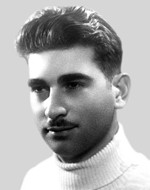Borkovsky, Yosef
Son of Boris and Chaya. He was born on August 7, 1933 in the city of Heilar in Manchuria (China). During the Chinese-Japanese War, during World War II, the Japanese killed his father and burned the family home. Yusef, who was 12 years old, his mother and brother were left without shelter and were forced to move to Harbin. The proud mother worked hard to support her children with dignity, without needing help. Yosef graduated from elementary school and continued in a vocational school where he studied welding frames. He had many friends who loved and respected him. After the establishment of the State of Israel, the family decided to immigrate to Israel in 1950. At first she was housed in Kibbutz Mishmar HaEmek and later in the Beit She’arim transit camp, where the family underwent all the hardships of those days. They then moved with a handful of other families to the town of Migdal Haemek where the family found its place. Joseph liked to read Russian literature and listen to classical music, but he did not always have the time to devote himself to it. Yosef enlisted in the IDF in early January 1951 and was only 17 and a half years old. He volunteered to serve in the medical corps, underwent various professional courses and was an outstanding trainee in a paramedics course. In 1960, he married a wife and settled in Petah Tikva, where he worked in the Dan garage and the Merkavim factory, and in every place he worked in the IDF. His work was loved by his colleagues and managers alike and earned him respect and respect as a person, as a good friend and an excellent professional, devoted to his work, and was a member of the Committee of the Association of Chinese Immigrants and of the Culture Committee of the Beit-Gil Cultural House. He collected stamps and lighters and had a rich collection of classical records, and after a few years decided to return to Migdal Ha’emek The family management returned to Migdal Ha’emek and Joseph ran his father’s shop, which was heartless and blind, and after he died, Yosef returned to his previous profession and was hired as a welding welder at Kibbutz Sarid. He was very devoted and loyal to his family and took care of everything he needed, and he tried to make it easy for his wife to help her with his housework and he did not want to go out without her. And during the Six-Day War, he did much to save the wounded and was even awarded the Six-Day War. On 26 June 1970, Sgt. Yosef fell in combat in the Golan Heights, when he was in the process of rescuing the injured and building them. Together with three paramedics and a doctor went out to help the UN personnel, who were shelled by the Syrians. He was brought to eternal rest in the cemetery in Migdal Ha’emek, where he left a wife and two children. His funeral was attended by hundreds of people who knew him and liked him in order to share his last honor. In a letter of condolence sent to the family by the defense minister, he wrote: “The late Sergeant Joseph Burkowski gave his life for his homeland. He was an excellent soldier and a model friend. Joseph was loved by everyone he knew. “The commander of his unit wrote to the widow:” We all knew and screened Yosef, our devoted paramedic, and many of us received his devoted care and encouragement, and as long as we were there, we knew that there was someone who would not abandon us and when we needed him, Who went out to rescue us in times of peace and in times of war … Without hesitation and with exemplary courage, he leaped into the shelling … In addition to being an excellent military medic, he was also an excellent person. “His manner, his charming smile, his modesty,
